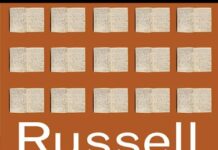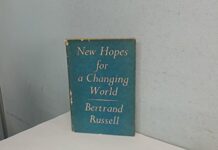
Ebook Info
- Published: 2009
- Number of pages: 178 pages
- Format: EPUB
- File Size: 0.19 MB
- Authors: Bertrand Russell
Description
First published in 1910, Philosophical Essays is one of Bertrand Russell’s earliest works and marks an important period in the evolution of thought of one of the world’s most influential thinkers. This selection of seven essays displays Russell’s incisiveness and brilliance of exposition in the examination of ethical subjects and the nature of truth. Insightful and highly accessible, these essays are as illuminating today as they were on first publication.
User’s Reviews
Reviews from Amazon users which were colected at the time this book was published on the website:
⭐Great read, though I disagree with much of Russell’s philosophy.
⭐I wish that Bertrand Russell would be read by everybody. His thoughts are the basic and clear in their core.
⭐Bertrand Arthur William Russell (1872-1970) was an influential British philosopher, logician, mathematician, and political activist. In 1950, he was awarded the Nobel Prize in Literature, in recognition of his many books such as
⭐,
⭐,
⭐,
⭐,
⭐,
⭐,
⭐, etc.He wrote in the Preface, “The volume to which this is a preface is essentially a reprint of a book, with the same title, published in 1910. However, two essays in that volume, namely ‘The Free Man’s Worship’ and ‘The Study of Mathematics’ were reprinted in ‘Mysticism and Logic’ and are therefore not included in the present volume. They are replaced by an article on history and one on Poincare’s ‘Science and Hypothesis.’”He wrote, “Some have contended that ‘good’ means ‘desired,’ others that ‘good’ means ‘pleasure,’ others again that it means ‘conformity to Nature’ or ‘obedience to the will of God.’ The mere fact that so many different and incompatible definitions have been proposed is evidence against any of them really being definitions; there have never been two incompatible definitions of the word ‘pentagon.’ None of the above are really definitions; they are all to be understood as substantial affirmations concerning the things that are good. All of them are, in my opinion, mistaken in fact as well as in form, but I shall not undertake here to refute them severally.” (Pg. 20)He argues, “among physically possible actions, only those which we actually think of are to be regarded as possible. When several alternative actions present themselves, it is certain that we can both do which we choose, and choose which we will. In this sense all the alternatives are possible. What determinism maintains is that our will to choose this or that alternative is the effect of antecedents; but this does not prevent our will from being itself a cause of other effects. And the sense in which different decisions are possible seems sufficient to distinguish some actions as right and some as wrong, some as moral and some as immoral.” (Pg. 42)He observes, “If we really believed that other people’s actions did not have causes, we could never try to influence other people’s actions; for such influence can only result if we know, more or less, what causes will produce the actions we desire. If we could never try to influence other people’s actions, no man could try to get elected to Parliament, or to ask a woman to marry him: argument, exhortation, and command would become mere idle breath. Thus almost all the actions with which morality is concerned would become irrational, rational actions would be wholly precluded from trying to influence people’s volitions, and right and wrong would be interfered with in a way in which determinism certainly does not interfere with them. Most morality absolutely depends upon the assumption that volitions have causes, and nothing in morals is destroyed by this assumption.” (Pg. 43-44)In an essay on Pragmatism, he quotes William James: “If I say, ‘Either accept this truth or go without it,’ I put on you a forced option, for there is no standing place outside of the alternative.’” But Russell then comments, “This statement appears to us to be contrary to many of the plainest facts of daily life. If, in walking along a country road, I come to a fork where there is no signpost and no passer-by, I have, from the point of view of action, a ‘forced’ option. I must take one road or other if I am to have any chance of reaching my destination; and I may have no evidence whatever as to which is the right road. I then ACT on one or other of the two possible hypotheses, until I find someone of whom I can ask the way. But I do not BELIEVE either hypothesis. My action is either right or wrong, but my belief is neither, since I do not entertain either of the two possible beliefs. The pragmatist assumption that I believe the road I have chosen to be the right one is erroneous.” (Pg. 84)He later states, “We have thus the following objections to the monistic theory of truth: (1) If no partial truth is quite true, this must apply to the partial truths which embody the monistic philosophy. But if these are not quite true, any deductions we may make from them may depend upon their false aspect rather than their true one, and may therefore be erroneous. (2) It is a consequence of the monistic theory that the parts of a whole are not really its parts. Hence there cannot be any genuine whole on this theory, since nothing can really be a whole unless it really has parts. (3) The theory is unable to explain in what sense one partial judgment is said to be true and another false, though both are equally partial. (4) In order to prove that there can only be one coherent whole, the theory is compelled to appeal to ‘experience’, which must consist in knowing particular truths, and this requires a notion of truth that the monistic theory cannot admit.” (Pg. 138-139)This book will be of keen interest to anyone studying Russell’s “early” philosophy.
⭐This book has opened a door in my mind.
Keywords
Free Download Philosophical Essays (Routledge Classics) 1st Edition in EPUB format
Philosophical Essays (Routledge Classics) 1st Edition EPUB Free Download
Download Philosophical Essays (Routledge Classics) 1st Edition 2009 EPUB Free
Philosophical Essays (Routledge Classics) 1st Edition 2009 EPUB Free Download
Download Philosophical Essays (Routledge Classics) 1st Edition EPUB
Free Download Ebook Philosophical Essays (Routledge Classics) 1st Edition





